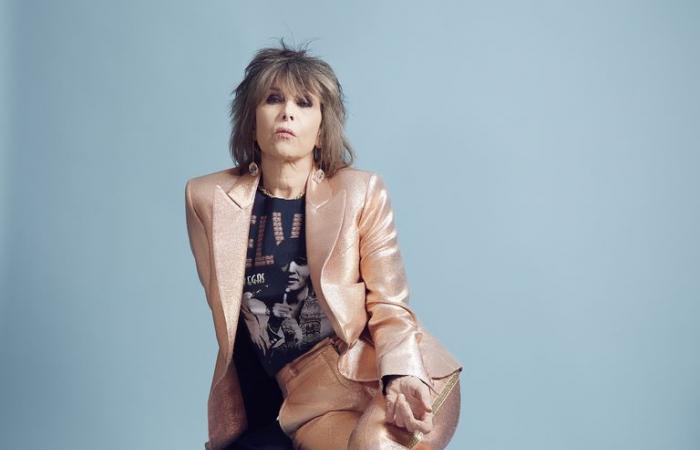By Sofía Durand Fernández
couch
To touch the guitar in his adolescence room in Ohio to live the London of the 70s without scales. First writing in the musical press and attending the Boutique Sex, recognized by its owners: Vivienne Westwood and Malcolm McLaren – Masonic of Sex Pistols. Then becoming the leader of one of the great British New Wave bands.
Chrissie Hynde has lived as many lives, and how many not also. With an inexplicable force, he has been able to face adversities and continue with the eye on the goal. He witnessed the massacre of Kent State University in 1970, his band was put on his shoulder after the death of two key members (James Honeyman-Scott and Pete Farndon), and for almost five decades he has managed to reinvent himself without getting lost on the road.
His opinions have left her in the eye of the storm more than once. In 2015, after having published his memoir (Reckless: My Life as a Pretender), granted a note to The Sunday Times in which he made controversial statements about sexual abuse: “You know, if you don’t want to attract a rapist you don’t wear high heel shoes because you can’t escape running.” As expected, the controversy soon arrived at social networks, such as X.
“People have definitely been castrated and it is not even worth saying what you really think because you know that you will have to keep talking about it for the next five years, justifying and explaining you,” he says in an interview with Beat beat.
His image is not seen on the screen, but with listening to his voice he reaches and left over. With a carefree tone and without fear of answering with frankness, Chrissie Hynde loved the London of his youth with affection, explains his compositional process that not only encompasses the lyrical, but also includes painting, and completely discards the idea of retiring at some point.
The Pretenders will perform this May 13 at the Antel Arena. Tickets can be acquired here.
What are you special in your Latin American audience?
First, they are very attractive, without the mood of seeming very superficial. I don’t want to criticize, but unlike some audiences, they are very cool and love rock. I know it is a generalization, but that was my experience when I have been in South America, they are very musical and rock fans.
Something characteristic about your career is your hunger of success. Not only have you had to overcome very difficult things in your career, but before you worked on many things. Was it a characteristic that you acquired consciously or does it belong to something more primitive?
I like the word “primitive.” I think it has to do with your dream, when you are sitting in your bed with the guitar at age 16 and you think “it would be great to be in a band.” For the moment I turned 19, I thought that my moment had already passed, because at that time rock used to be only for teenagers. Then I had a lot of jobs. Actually, not everyone, but it was not very good as a waitress or in those other things. I was the one that was not good, not the jobs.
When the time came and I could enter the band, I valued every day, because that was what the other boys of the band and I wanted since we were children, and we got it, so you never forget it, or for a minute.
SOS de Ohio, United States. At the time, you moved directly to London, you did not make a scale, such as New York or other cultural center within your country. Why did you decide to emigrate to Britain and how did you live that contrast?
I knew I wasn’t going to stay in Ohio. I don’t know how I knew, but I knew. And he loved all the English music of the 60s, so it was the place he had to go. I was not interested in going to New York, or Los Angeles, or any of those places.
Belong to the transition generation between the 60s and the principle of 70. At that time, the consequent social changes led to a sense of disappointment. How did you live them as an artist?
I never considered an artist, to this day. But having lived it as a rock star, getting out of the 60s with the death of Hendrix and Janis Joplin, and the rupture of the Beatles, seemed that everything was reaching a disastrous end. It was a bad end. And suddenly David Bowie, the Sex Pistols and Punk appeared, some great things began to happen, and that saved the 70. So I’m glad to have been part. There were many transitions, but it was quite exciting. I think, at the time, everyone was constantly talking about how bad everything was. But then, when ten years passed, I looked back and thought: “Oh, how great was all then.” As you aged, you realize that this happens every ten years: you look back with love. So I try to think that what I do now is good, instead of remembering it.
It is the component of nostalgia.
Well, I am nostalgic, because I love that London of the 60s where everything was changing. I fell in love a little of that and I miss him. So I am guilty of a certain degree of nostalgia, but I try not to be because I think it has some negative.
When you sit down to write your songs, what elements do you evoke? How does your compositional process work?
It has changed over the years. Before I started with the guitar, and now I can sit and write some lyrics. I have been collaborating with James Walbourne, my guitarist, so we wrote together. I guess, if you write or paint, you simply illustrate what you see in front of you.
You wrote your memoir, you paint and you are an avid reader. How do these different art forms combine in your creative process?
I think they complement each other. Being in a band is more social, you do it in front of an audience. I am not really a writer, I wrote those memories without using a ghostwriterbut I do not consider a writer. When I think of a writer, I think of García Márquez or someone who really knows how to write, I’m just an amateur.
Painting is fun because it is very lonely, I do it when I am alone. It is a matter of making constant choices, each brushstroke is a choice, and that is very satisfying. I never know what I’m going to end up creating, I just start and something goes out, sometimes it’s good, other times not so much.
On several occasions you have remembered that when you started playing really shy, so you took time alone to write. The process of composing music can also be lonely.
It is lonely. I think, in general, all of us who are in a rock band are shy, we only leave our peel when we are on stage. There we can seem safe, but in reality, most of us are not very good if we have to do interviews, even video clips. Most musicians simply hide behind their instruments, but on the stage they come alive.
It can be something performative, like a kind of alter ego. How do you take care of your mind when you are a shy person, but you have to get on a stage in front of thousands of people?
You don’t think about that, you just still are yourself. I don’t think it’s an alter ego, maybe if you’re actor, but I don’t know anything about that. In a rock band you become more who you really are when you are on stage, and that allows you to be a bit bold, do things that you would not do, because you are in your band and that gives you that freedom.
With social networks, people are supposed to be more authentic and defend their positions more. Being someone who usually says what he thinks without many capujos, how do you see the current rock scene in this regard? Is there a lot of political correction?
People have definitely been castrated and it is not even worth saying what you really think because you know that you will have to keep talking about it for the next five years, justifying and explaining you. So I think that with social networks and political correction they have repressed people, and you get to the point of thinking: “I will not say anything.” There is some irony in that, because we talk about people, musicians and public figures, which were previously very frank and said what they thought. But in recent years, you simply think it’s not worth doing.
If the cancellation culture had existed in the 60s and 70s, we would have run out of rock stars.
Not like the ones we have today, that’s true. Before everyone could express themselves, and now maybe they want, but they know they will have to keep talking about the same subject for months because there will be some negative reaction. But I think people are already a little fed up with all that, and I think we are about to bend the corner. I don’t know how will happen, who knows? But I feel that people are getting tired of this confessional culture, that everyone has a problem, of victimization.
You identify yourself as a feminist, however, you have been critical about how feminism has developed in recent years.
I feel that I am the girl in the feminism poster because I do what I want to do. That’s what it is about: get the right to vote, the right to work. And we already get those things. The only thing I think some feminist could have a problem with me would be because I have no complaints, I never felt discriminated, no man told me that I could not do what I wanted. I don’t think I had a difficult life for being a woman. Being honest, having been a man would not have come so far, because he would have been mediocre.
I don’t think I had to do more for being a woman. In fact, I have been quite vague and the boys do a lot of work for me, they load and refine the guitars so that I can simply sit and thank them.
Is retreating an option or plan to do this until your last day?
I don’t think “retire” is the word, but I think of leaving it every day. I wonder if I should continue doing this, who cares. I suppose that is the existential issue that I always have in mind. But retire no. I think that people who “retire” usually have office work, and when they retire they have the opportunity to devote themselves to a hobby, something they always wanted to do. But if you are in a rock band, you are already doing what you always wanted to do, so you can’t retire from that.
By Sofía Durand Fernández
couch







